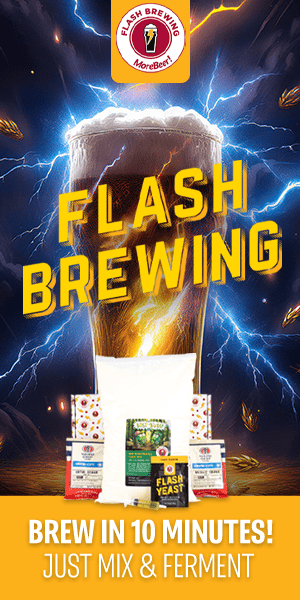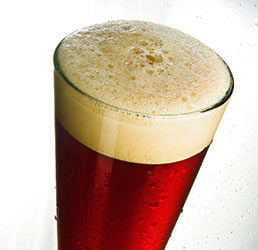Victory Brewing Co.’s St. Victorious Doppelbock clone
Victory Brewing Co.’s St. Victorious Doppelbock clone
(5 gallons/19 L, all-grain)
OG = 1.080 FG = 1.022
IBU = 27 SRM = 21 ABV = 7.6%
Ingredients
9.5 lbs. (4.3 kg) German Pilsner malt
5.25 lbs. (2.4 kg) dark Munich malt (9 °L)
12 oz. (340 g) Caramunich® III malt (58 °L)
12 oz. (340 g) Weyermann Beechwood Smoked malt
8 oz. (227 g) Caraaroma® malt (150 °L)
2.5 oz. (70 g) Carafa® Special I malt
5.3 AAU Tettnang Mittelfrüh hops (60 min.) (1.33 oz./38 g at 4% alpha acids)
3 AAU Tettnang Mittelfrüh hops (15 min.) (0.75 oz./21 g at 4% alpha acids)
1 Whirlfloc tablet (15 min.)
1 g Yeastex yeast nutrient (15 min.)
SafLager W-34/70, White Labs WLP830 (German Lager), or Wyeast 2124
(Bohemian Lager) yeast
3⁄4 cup corn sugar (if priming)
Step by Step
Mash in at 122 °F (50 °C) using a thick mash. Immediately raise to 149 °F (65 °C) and hold for 10 minutes. Remove about a third of the mash using a colander to strain out most of the liquid. Raise this portion to 158 °F (70 °C), hold for 10 minutes, then raise to boil and boil for 15 minutes. Move the boiling mash to the main mash and stir, with the combined mash hitting a temperature of 158 °F (70 °C).
Decoct again, removing about 30% of the mash, and bring it to a boil for 5 minutes. Move the boiling mash to the main mash and stir, with the combined mash hitting a temperature of 170 °F (77 °C). Recirculate for 10 minutes, or until clear, and then begin wort collection.
Begin sparging the grains when they are first exposed during runoff, collecting 6.5 gallons (25 L) of wort to account for the longer boil. Boil for 90 minutes, adding the hops, Yeastex, and Whirlfloc according to the specified schedule in the ingredient list.
Chill to 52 °F (11 °C) and transfer to the fermenter. Pitch a large, healthy dose of yeast and oxygenate thoroughly if using a liquid yeast strain. Three packages of yeast in a starter or two packages started separately should give you the right amount of liquid yeast to effectively ferment this huge beer. If using dried yeast, pitch three sachets. As fermentation begins to slow, allow to rise to 58 °F (14 °C) to finish fermenting. Hold the beer at 58 °F (14 °C) until no diacetyl is detected, usually 2–4 days. Rack beer to remove yeast.
Cool the beer down to 32 °F (0 °C) over 7–10 days and hold for a minimum of four weeks. Force carbonate to 2.6 v/v or add priming sugar to bottle ferment.
Partial mash version:
Replace Pilsner malt with 5.2 lbs. (2.36 kg) Pilsen dried malt extract. This large lager will require a 3-step extract process. The main base malt will come from the dried malt extract, while the dark Munich and smoked malt will need to be mashed. The caramel and Carafa® malts will only need to be steeped.
Raise 3 gallons (11 L) of clean brewing water to achieve a mash temperature of 149 °F (65 °C) once you add the muslin bag containing the crushed Munich and smoked malts. Hold for at least 60 minutes. Meanwhile, pre-boil then chill 3 gallons (11 L) of water to use later for topping up the fermenter. During the last 15 minutes of the mash, add the muslin bag of steeping grains (containing the caramel and Carafa® malts). Once the mash/steeping is complete, remove the bags, letting the liquid drain into the kettle.
Raise to near-boiling temperatures, remove pot from flame and slowly stir in half of the malt extract. Return to flame and bring to boil for 60 minutes. Add ingredients at times indicated and the remainder of the malt extract with 5 minutes left in the boil.
Follow the remainder of the all-grain recipe, topping the fermenter up to 5 gallons (19 L) after chilling with pre-boiled water.
Tips for success:
The decoction mashing (in the all-grain version) can make lautering difficult. Start slow and steady and only increase the rate of runoff after you have begun sparging.
The decoction routine in this recipe took several iterations to hit the correct temperatures so use this as a guide knowing you may need to adjust to the peculiarities of your system. Decoction does increase the color, so if you cannot (or do not want to) use the described decoction method, increase one of the darker malts to achieve the same color.
As with all lagers, but particularly strong dextrinous doppelbocks, yeast quantity and quality is critical to determine the ultimate drinkability and quality of the beer.
It is practically impossible to over age this beer. As it ages, the flavors smooth, and the drinkability increases. Victory prefers a minimum tank time of two months but even better results can be achieved in 3–4 months.
Written by Dave Clark

A strong lager featuring many malts to add complexity across the palate, St. Victorious Doppelbock takes it a step further by adding a small addition of Beechwood smoked malt, a nod to the Franconian region in and around Bamberg, Germany.



